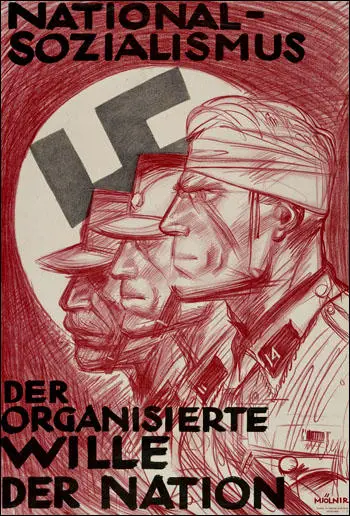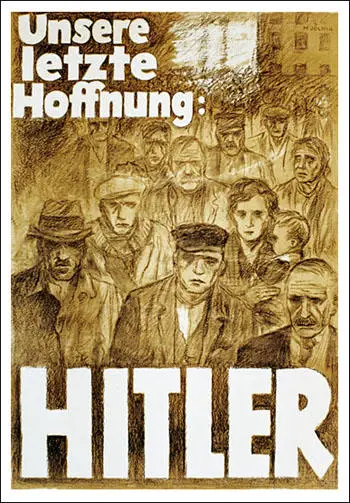1933 Election in Germany
Although Adolf Hitler had the support of certain sections of the German population he never gained an elected majority. The best the National Socialist German Workers Party (NSDAP) could do in a election was 37.3 per cent of the vote they gained in July 1932. When Hitler became chancellor in January 1933, the Nazis only had a third of the seats in the Reichstag.
Soon after Adolf Hitler became chancellor he announced new elections. Hermann Goering called a meeting of important industrialists where he told them that the 1933 General Election could be the last in Germany for a very long time. Goering added that the NSDAP would need a considerable amount of of money to ensure victory. Those present responded by donating 3 million Reichmarks. As Joseph Goebbels wrote in his diary after the meeting: "Radio and press are at our disposal. Even money is not lacking this time."

Behind the scenes Goering, who was minister of the interior in Hitler's government, was busily sacking senior police officers and replacing them with Nazi supporters. These men were later to become known as the Gestapo. Goering also recruited 50,000 members of the Sturm Abteilung (SA) to work as police auxiliaries.
Hermann Goering then raided the headquarters of the Communist Party (KPD) in Berlin and claimed that he had uncovered a plot to overthrow the government. Leaders of the KPD were arrested but no evidence was ever produced to support Goering's accusations. He also announced he had discovered a communist plot to poison German milk supplies.
Just before the election was due to take place someone set fire to the Reichstag. A young man from the Netherlands, Marianus van der Lubbe, was arrested and eventually executed for the crime. As a teenager Lubbe had been a communist and Goering used this information to claim that the Reichstag Fire was part of a KPD plot to overthrow the government.

Hitler gave orders that all leaders of the German Communist Party should "be hanged that very night." Paul von Hindenburg vetoed this decision but did agree that Hitler should take "dictatorial powers". KPD candidates in the election were arrested and Hermann Goering announced that the Nazi Party planned "to exterminate" German communists.
Thousands of members of the Social Democrat Party and Communist Party were arrested and sent to recently opened to concentration camp. They were called this because they "concentrated" the enemy into a restricted area. Hitler named these camps after those used by the British during the Boer War.
Left-wing election meetings were broken up by the Sturm Abteilung (SA) and several candidates were murdered. Newspapers that supported these political parties were closed down during the 1933 General Election.
Although it was extremely difficult for the opposition parties to campaign properly, Adolf Hitler and the Nazi Party still failed to win an overall victory in the election on 5th March, 1933. The NSDAP received 43.9% of the vote and only 288 seats out of the available 647. The increase in the Nazi vote had mainly come from the Catholic rural areas who feared the possibility of an atheistic Communist government.
| Political Parties in the Reichstag | May 1924 | Dec. 1924 | May 1928 | Sep. 1930 | July 1932 | Nov. 1932 | Mar. 1933 |
|---|---|---|---|---|---|---|---|
| Communist Party (KPD) | 62 | 45 | 54 | 77 | 89 | 100 | 81 |
| Social Democratic Party (SDP) | 100 | 131 | 153 | 143 | 133 | 121 | 120 |
| Catholic Centre Party (BVP) | 81 | 88 | 78 | 87 | 97 | 90 | 93 |
| Nationalist Party (DNVP) | 95 | 103 | 73 | 41 | 37 | 52 | 52 |
| Nazi Party (NSDAP) | 32 | 14 | 12 | 107 | 230 | 196 | 288 |
| Other Parties | 102 | 112 | 121 | 122 | 22 | 35 | 23 |
